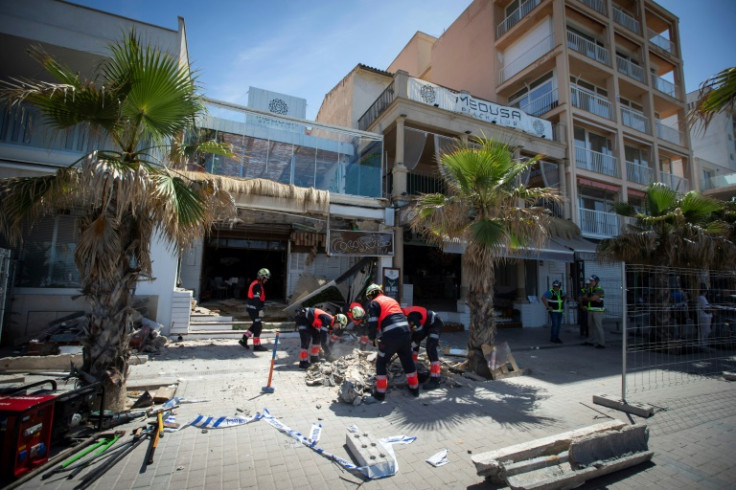
Spanish fire crews picked through the wreckage of a beachfront restaurant on the holiday island of Mallorca on Friday, searching for clues after it partially collapsed, killing four people and injuring 16.
Authorities, who declared three days of mourning, gave no immediate indication of the cause but a fire official said the "excessive weight" of a crowd in the building was most likely to blame.
Those killed were two German women, aged 20 and 30, a 44-year-old Senegalese man and a 23-year-old Spanish woman who worked at the venue, a police spokesman said.
The packed two-storey building collapsed late on Thursday afternoon in a busy tourist area of Palma de Mallorca, the capital of the Mediterranean island.
The tourist season is already in full swing in the Balearic Islands, which also includes Ibiza and Menorca.
Firefighters were deployed in numbers, ambulances rushed victims to hospital and the street was sealed off by police to allow rescue teams to work, an AFP journalist saw.
Of the 16 people who were injured, eight remain in hospital, all of them Dutch nationals, Palma de Mallorca mayor Antonio Jimenez told reporters after observing a minute of silence for the victims.
"The seriously injured are out of danger," he added.
The Senegalese man and the Spanish woman who died were both residents on the island, Jimenez said, adding that it was a "very sad" day for the city.
Local media said the Senegalese man and a compatriot had rescued a swimmer from drowning in December 2017, winning him a police medal the following year.
The building comprised the Medusa Beach Club -- a street-level restaurant with a rooftop terrace -- and a basement bar, which were all crowded at the time of the disaster.
The head of the Palma fire service, Eder Garcia, said the restaurant floor had collapsed onto the bar below, which is "where we found the most victims".
"The causes are being investigated. The first hypothesis is that it was possibly due to excessive weight," he told reporters at the scene, adding the building has "an old structure".
A technical team was at the site on Friday to determine the cause of the collapse.
Santiago Aranga, a local who was walking his dog across the street from the seafront venue at the time of the accident, said he heard a "boom" that sounded "like a bomb".
"There was screaming, crying, hysterics," he told television station TRECE.
Most people in the area were German tourists and "it was very difficult to try to calm them down, to pull people out in another language. I don't understand or speak German," he added.
Another local resident, Vicky Garcia, said the venue had only recently reopened after being refurbished.
"We heard a roar, then a lot of police, a lot of firemen, a lot of commotion," she told local television IB3.
Speaking at a business forum in Barcelona, Spanish Prime Minister Pedro Sanchez conveyed his condolences to the victims' families.
"I would also like to express my best wishes for a speedy recovery to the injured," he added.
Mallorca is known for its pristine waters and beaches, and the Balearic Islands attract more tourists than all other Spanish regions except Catalonia.
More than 14 million tourists visited the islands last year, according to official figures.
Thursday's collapse took place at the start of the archipelago's peak tourist season, on a beachfront avenue home to several shops and entertainment venues.
A 2009 collapse of a three-story building in Palma de Mallorca killed seven people, including three Colombians and two Germans.







